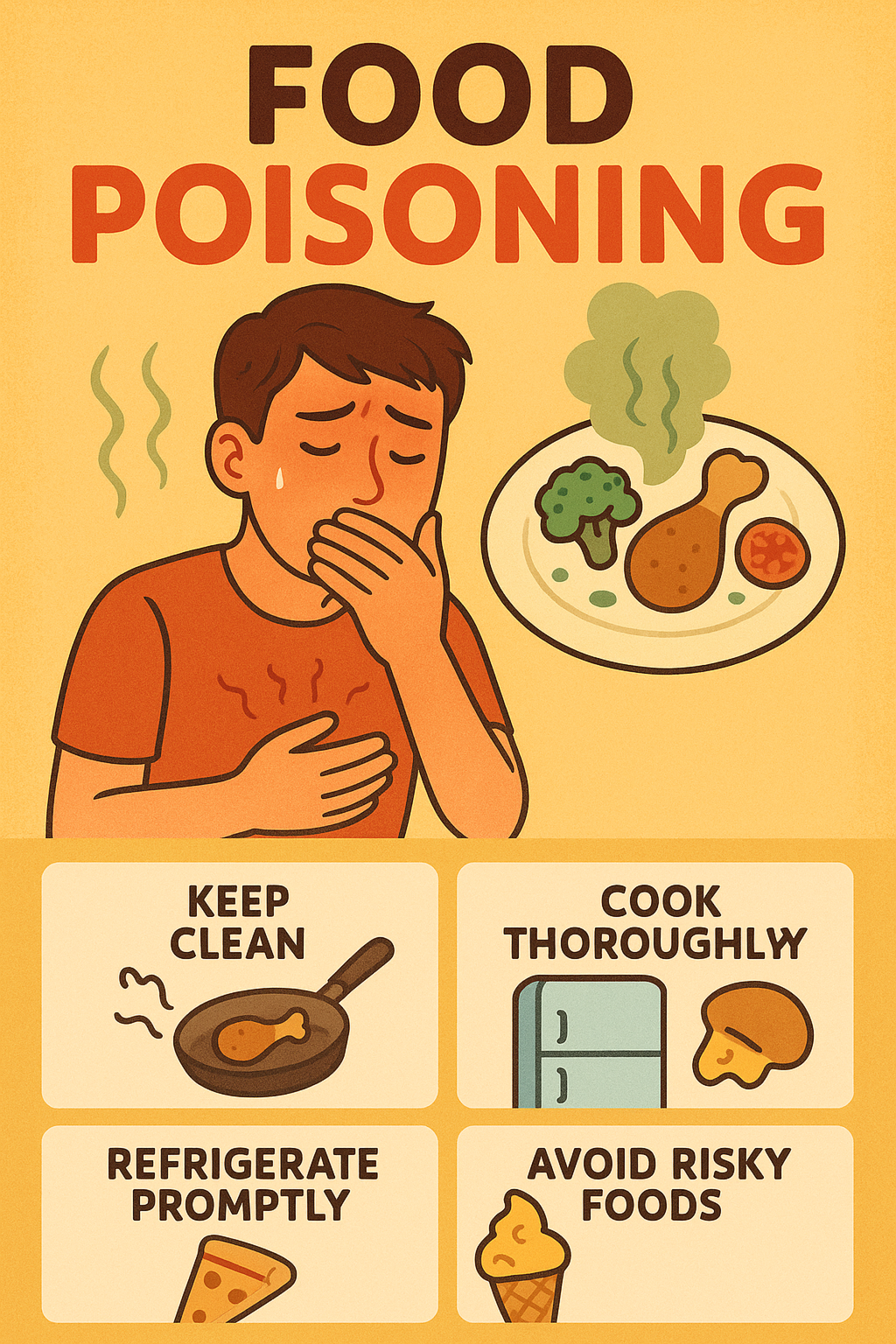"Food Poisoning: Symptoms, Care and When To See A Doctor"
Last updated: 26 Jun 2025
1072 Views

A Common Yet Potentially Serious Illness
Food poisoning is an illness caused by consuming food or drinks contaminated with microorganisms such as bacteria, viruses, parasites, or the toxins they produce. While symptoms are often mild and resolve within a few days, in some cases, food poisoning can become severe and require hospitalization.
⸻
Causes of Food Poisoning:
1. Bacteria
⸻
Symptoms of Food Poisoning:
Symptoms typically begin within 1 to 6 hours after eating contaminated food, though some may appear up to 72 hours later depending on the cause.
⸻
When to See a Doctor:
Although most cases resolve on their own, you should seek medical attention if you experience:
⸻
How to Prevent Food Poisoning:
Food poisoning is an illness caused by consuming food or drinks contaminated with microorganisms such as bacteria, viruses, parasites, or the toxins they produce. While symptoms are often mild and resolve within a few days, in some cases, food poisoning can become severe and require hospitalization.
⸻
Causes of Food Poisoning:
1. Bacteria
- Salmonella: Commonly found in raw eggs or undercooked meat
- E. coli: Often linked to ground beef or improperly washed fresh vegetables
- Listeria: Can be found in unpasteurized dairy products or improperly stored refrigerated foods
- Norovirus: Easily transmitted via contaminated food, water, or surfaces
- Hepatitis A: Spread through ingestion of food or water contaminated with fecal matter
- Toxins from Staphylococcus aureus or Clostridium botulinum (e.g., improperly canned foods)
- Consuming undercooked food
- Leaving food unrefrigerated for too long
- Using unclean utensils or hands when preparing meals
⸻
Symptoms of Food Poisoning:
- Nausea and vomiting
- Abdominal cramps or pain
- Diarrhea (may contain blood)
- Fever and chills
- Headache
- Fatigue and dehydration
Symptoms typically begin within 1 to 6 hours after eating contaminated food, though some may appear up to 72 hours later depending on the cause.
⸻
When to See a Doctor:
Although most cases resolve on their own, you should seek medical attention if you experience:
- Persistent vomiting for more than 24 hours
- Severe or frequent diarrhea
- High fever (above 38.5°C / 101.3°F)
- Blood in vomit or stool
- Signs of dehydration: dry mouth, little or no urination, dizziness
- Symptoms that do not improve within 2 days
Note: Children, the elderly, and individuals with chronic health conditions are more vulnerable to complications.
⸻
First Aid for Food Poisoning at Home:
- Stay hydrated by drinking plenty of fluids, preferably oral rehydration solutions (ORS)
- Avoid greasy, spicy foods, dairy products, and alcohol
- Get plenty of rest
- Eat bland, easy-to-digest food such as rice porridge, bananas, toast
- Do not take anti-diarrheal medication without consulting a doctor, as it may trap harmful bacteria in your intestines
⸻
How to Prevent Food Poisoning:
- Always wash hands thoroughly before and after handling food
- Keep raw and cooked foods separated (use different cutting boards and utensils)
- Cook food thoroughly, especially meats
- Refrigerate leftovers immediately
- Check expiration dates before consuming any packaged food
- Drink clean, safe water and avoid ice from questionable sources
- Avoid eating from unhygienic or unregulated food vendors
⸻
Conclusion:
While food poisoning may seem like a minor inconvenience, it can become life-threatening if not managed properly, especially in vulnerable individuals. Practicing safe food handling and hygiene is the best defense. If symptoms persist or worsen, seek medical care promptly.
⸻
Need Medical Help or Advice?
Visit Doctor Lamai Clinic today. Our healthcare professionals are available 7 days a week to provide care and support.
Call us: 065-262-9396
WhatsApp: +66 65 262 9396
Visit us at Doctor Lamai Clinic (open daily 9:00 AM to 7:00 PM)
Related Content
